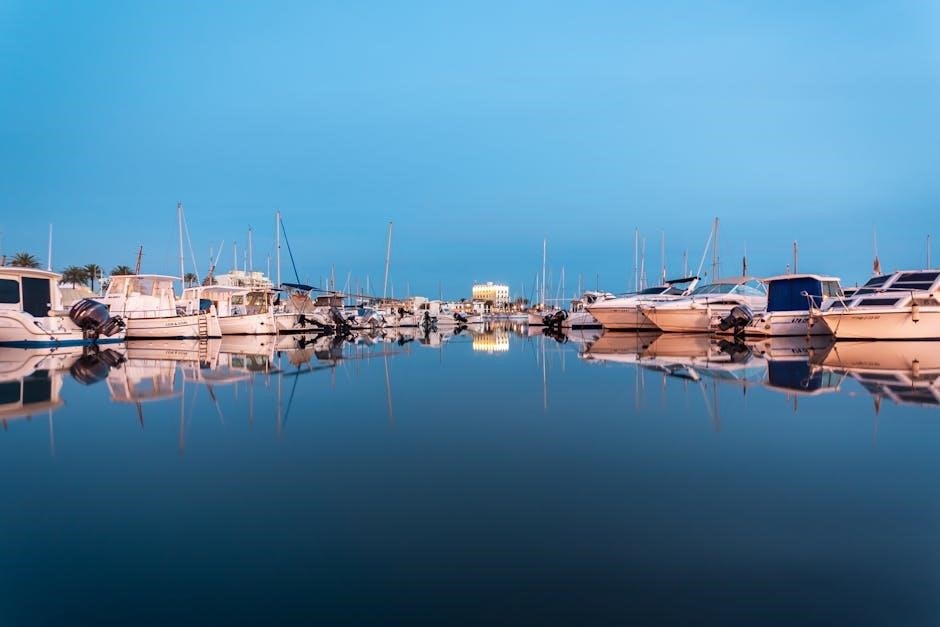russie mediterranee pdf

Russia’s growing influence in the Mediterranean reflects its strategic ambitions, combining geopolitical goals, military presence, and economic investments to reassert itself as a global power․
Historical Context of Russian Influence in the Mediterranean
Russia’s Mediterranean ambitions date back to the 19th century, seeking a foothold in the region․ Post-Soviet decline curtailed influence, but 21st-century strategies revived its regional presence․
2․1․ Early 19th and 20th Century Russian Ambitions in the Region
Russia’s Mediterranean ambitions emerged in the 19th century, driven by desires to counterbalance British and French dominance․ The construction of the Suez Canal in 1869 heightened Russia’s interest, as it provided a direct trade route to Asia․ By the early 20th century, Russia sought to establish naval bases in the region, particularly in Syria and Lebanon, to project power and protect Orthodox Christian communities․ However, World War I and the subsequent Russian Revolution disrupted these plans, leading to a decline in influence․ The interwar period saw limited Russian engagement, setting the stage for renewed efforts post-1945․
2․2․ Post-Soviet Era and the Re-Emergence of Russian Interests
Following the Soviet Union’s collapse, Russia’s Mediterranean presence diminished, but the post-Soviet era saw a gradual resurgence․ By the 2000s, under Vladimir Putin’s leadership, Russia sought to reclaim its influence․ The 2015 maritime doctrine emphasized the Mediterranean’s strategic importance for projecting power and securing energy interests․ Syria became a key foothold, with the reopening of the Tartous naval base in 2017, solidifying Russia’s permanent presence․ Economic partnerships and energy projects further deepened ties, as Russia leveraged its role in regional conflicts to enhance its geopolitical standing, marking a significant shift from its post-Cold War decline to renewed assertiveness in the region․

Strategic Importance of the Mediterranean for Russia
The Mediterranean is vital for Russia’s energy exports, naval access, and countering Western influence, enhancing its global power projection and economic interests in the region;
3․1․ Geopolitical Objectives and Power Projection
Russia seeks to counter Western dominance in the Mediterranean by projecting naval and military power, ensuring access to strategic waterways and strengthening ties with regional allies․ Military exercises, including hypersonic missile tests, demonstrate its capability to operate effectively in the region․ The Mediterranean also serves as a gateway for Russian influence in Africa and the Middle East, aligning with Moscow’s goal of countering NATO and EU influence․ By establishing a permanent naval presence and leveraging bases like Tartous in Syria, Russia enhances its ability to project power and secure energy export routes, reinforcing its role as a global maritime power․ This strategy underscores its ambitions to reshape regional dynamics․
3․2․ Economic Interests and Energy Resources
Russia’s economic interests in the Mediterranean focus on expanding its energy influence, particularly through oil and gas projects․ Partnerships with Syria and Libya highlight its strategic aim to secure resources and export routes․ The region’s proximity to European markets makes it a vital hub for Russian energy exports, diversifying beyond Eastern Europe․ Infrastructure development, such as ports and pipelines, strengthens economic ties and bolsters Russia’s geopolitical presence, countering Western dominance while ensuring energy security and market access․

Military Presence and Naval Deployments
Russia maintains a permanent naval task force in the Mediterranean, bolstering its military presence and strategic reach․ Key bases, such as Tartous in Syria, enhance operational capabilities․
4․1․ Permanent Naval Task Force in the Mediterranean
Russia’s permanent naval task force in the Mediterranean underscores its commitment to maintaining a robust military presence․ Established to ensure strategic flexibility, the task force conducts regular exercises, including missile launches, to demonstrate capabilities․ Recent activities, such as hypersonic missile tests, highlight its role in projecting power․ The presence also supports Russia’s regional allies, like Syria, and counters rival naval forces․ This sustained deployment signals Moscow’s intent to secure its interests and influence in the Mediterranean, ensuring a visible and active role in the region’s security dynamics․
4․2․ Military Bases and Logistics Hubs (e․g․, Tartous, Syria)
Russia’s military bases in the Mediterranean, such as Tartous, Syria, serve as critical logistics hubs, enabling sustained naval and military operations․ Tartous, operational since 1971, has been modernized to support larger fleets and enhance maintenance capabilities․ These bases provide strategic anchor points, facilitating power projection and ensuring a constant presence․ They also bolster Russia’s regional alliances and offer operational flexibility during conflicts․ The expansion of such facilities underscores Moscow’s long-term commitment to securing its Mediterranean interests, reinforcing its role as a key regional actor․

Russia’s Role in Regional Conflicts
Russia actively engages in Mediterranean conflicts to protect strategic interests, projecting power and securing influence through military and diplomatic means, often shaping regional dynamics to its advantage․
5․1․ Syrian Civil War and Russian Intervention
Russia’s intervention in Syria marked a pivotal moment in its Mediterranean strategy․ By supporting Bashar al-Assad, Moscow secured a strategic foothold, enabling access to naval bases like Tartous․ Military exercises and missile launches showcased Russia’s capabilities, while countering Western influence․ The conflict allowed Russia to project power, enhance its regional credibility, and safeguard energy interests․ Naval deployments and airstrikes underscored its commitment to maintaining a strong presence․ This intervention not only stabilized Assad’s regime but also cemented Russia’s role as a key Mediterranean actor, with implications for regional security and global geopolitics․
5․2․ Influence in Libya and North Africa
Russia has expanded its influence in Libya and North Africa, leveraging the region’s instability to strengthen its Mediterranean foothold․ By backing General Khalifa Haftar, Moscow aims to gain political and military leverage, potentially securing access to strategic ports and energy resources․ This intervention reflects Russia’s broader strategy to counter Western influence and enhance its role in regional conflicts․ The presence of Russian mercenaries and diplomatic engagement underscores its ambition to shape outcomes in Libya, aligning with long-term goals of projecting power in the Mediterranean and securing energy interests․ This strategy also positions Russia as a key player in North Africa, challenging European and NATO interests․

Economic and Energy Investments
Russia focuses on energy resources and infrastructure development in the Mediterranean, enhancing its economic influence and access to key trade routes, projecting power through strategic investments․
6․1․ Oil and Gas Projects in the Mediterranean
Russia has significantly expanded its energy influence in the Mediterranean through strategic oil and gas projects, strengthening partnerships with regional states like Syria and Turkey․ These initiatives not only enhance Russia’s economic presence but also solidify its geopolitical standing․ By investing in energy infrastructure, Moscow gains access to critical supply routes, countering Western dominance․ Such projects also align with Russia’s broader goal of becoming a pivotal player in global energy markets, leveraging the Mediterranean’s strategic location to expand its influence․ These efforts underscore Russia’s long-term commitment to economic and energy dominance in the region, reinforcing its role as a key international power․
6․2․ Infrastructure Development and Trade Routes
Russia has actively invested in infrastructure development across the Mediterranean, focusing on ports, rail networks, and trade routes to enhance its economic and strategic presence․ These projects, often aligned with local partners, aim to streamline trade flows and strengthen Russia’s access to key markets․ By modernizing ports and improving logistics, Moscow seeks to bolster its trade volumes, particularly in energy resources and agricultural products․ Such initiatives not only foster economic cooperation but also reinforce Russia’s influence in the region, positioning it as a vital player in Mediterranean trade dynamics and connecting it more deeply with European and African economies․ This strategy underscores Russia’s commitment to long-term economic integration and stability in the area․
Challenges and Threats to Russian Interests
Russia faces security threats, naval incidents, and international rivalries in the Mediterranean, compounded by sabotage attacks on its ships, such as the Ursa Major, highlighting vulnerabilities․
7․1․ Security Threats and Naval Incidents
Russia’s naval presence in the Mediterranean faces growing security threats, including sabotage and terrorism․ The sinking of the Ursa Major cargo ship, attributed to a terrorist attack, underscores these risks․ Such incidents not only threaten Russian assets but also disrupt maritime stability․ Additionally, heightened international tensions, particularly with NATO, increase the likelihood of naval confrontations․ These challenges highlight the precarious nature of Russia’s operations in the region, where maintaining security while projecting power remains a critical and complex endeavor․
7․2․ International Rivalries and Competition
Russia’s expanding influence in the Mediterranean has intensified competition with Western powers, particularly NATO and the EU․ Moscow’s military exercises, including missile tests, have drawn concern from regional actors․ The presence of Russian naval forces and strategic partnerships with Syria and Libya challenge Western dominance․ Additionally, Russia’s energy projects and infrastructure investments in the region further complicate geopolitical dynamics, creating tensions with European and American interests․ These rivalries underscore the Mediterranean’s role as a contested space, where global powers vie for influence, resources, and strategic advantage, heightening the region’s significance in international relations and security frameworks․
Future Prospects and Conclusion
Russia’s Mediterranean strategy aims to secure long-term influence, balancing geopolitical and economic goals․ However, rising competition and regional tensions may challenge its sustained presence and ambitions․
8․1․ Long-Term Strategic Goals in the Mediterranean
Russia aims to establish itself as a dominant player in the Mediterranean, ensuring access to key trade routes and energy resources․ By maintaining a strong naval presence and strategic alliances, Moscow seeks to counterbalance Western influence and project power globally․ Economic investments, particularly in oil and gas projects, are central to these efforts․ Additionally, Russia’s foothold in Syria and Libya underscores its commitment to long-term stability in the region, ensuring a secure environment for its economic and geopolitical interests․ These strategic goals reflect Russia’s broader ambition to reassert itself as a major global power․
8․2․ Potential Scenarios and Implications for Global Security
Russia’s Mediterranean expansion could lead to heightened tensions with NATO and EU nations, potentially destabilizing the region․ A stronger Russian presence may challenge existing security frameworks, impacting global energy markets and trade routes․ Increased competition could escalate conflicts in areas like Libya and Syria, with broader implications for international relations․ Conversely, cooperation between Russia and Western powers might foster stability, though this remains uncertain․ Overall, Russia’s Mediterranean strategy poses significant risks to global security, emphasizing the need for diplomatic engagement to mitigate potential flashpoints and ensure a balanced distribution of power in the region․